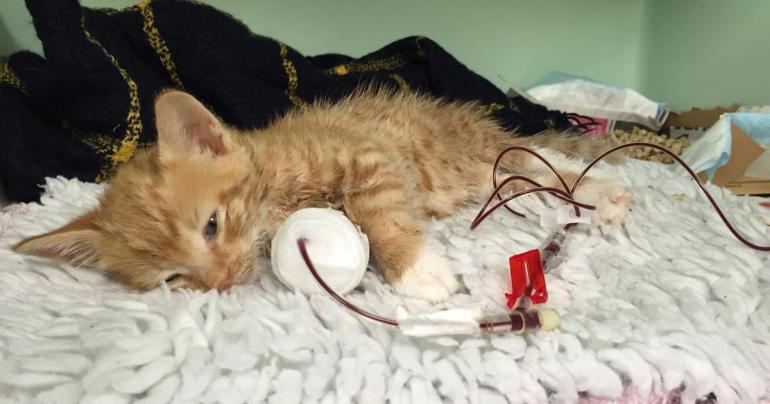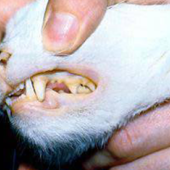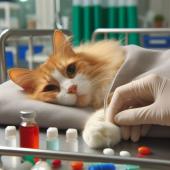Cat Blood Transfusion: Understanding the Procedure, Benefits, and Considerations for Your Pet

When a cat experiences severe illness, surgery, or trauma resulting in significant blood loss or anemia, a blood transfusion might be necessary to save their life. While blood transfusions can be lifesaving, they are complex medical procedures that require careful consideration.
Blood transfusion - is it right for my pet?
The administration of various blood components, such as red blood cells together with whole blood or only the plasma component, is referred to as a blood transfusion. In actuality, a specific blood component is more frequently donated to pets than a simple whole blood donation. Similar to human blood banks, there are now animal blood banks where pets donate blood that is kept on hand for emergency usage. At a blood bank, every unit of blood is divided into several components and processed so that each contribution can benefit multiple animals.
 Understanding Blood Transfusions in Cats
Understanding Blood Transfusions in Cats
A blood transfusion involves transferring blood or specific blood components from a donor cat to a recipient cat. The transfusion can include whole blood, packed red blood cells, plasma, or platelets, depending on the cat's condition and requirements.
Why does my pet need a blood transfusion?
There are numerous causes for a pet to need blood transfusions. You can be certain that your pet requires a transfusion if your veterinarian has suggested that they do. Blood donation procedures are generally standard, but donors see their blood donations as priceless gifts that are used only when absolutely necessary. Transfusions can be beneficial in a variety of situations, including anemia (low red blood cell counts), blood loss from trauma or surgery, chronic bleeding from a blood clotting problem (which can result from poisoning), and infrequently low blood protein levels.
When is a Blood Transfusion Necessary?
Blood transfusions might be necessary in the following situations:
-
Severe Anemia: Cats with a low red blood cell count may require a transfusion to improve oxygen delivery to vital organs.
-
Trauma or Surgery: Cats involved in accidents or undergoing extensive surgeries might experience significant blood loss, necessitating a transfusion to stabilize their condition.
-
Blood Disorders: Certain blood disorders, such as clotting disorders or hemophilia, may require specific blood components to manage the condition.
Is it safe for my pet to receive a blood transfusion?
A blood transfusion involves introducing foreign blood cells into an animal's bloodstream and is considered a type of transplant. Naturally, there are some hazards involved in this. It is possible to perform tests to determine your pet's blood type and make sure the blood being supplied to them closely resembles their own blood. Nevertheless, a response could happen in a tiny percentage of people.
With careful monitoring, the blood transfusion can continue in the majority of cases where the reaction is not severe. A serious transfusion reaction could happen, and in extremely rare circumstances, this could be lethal. Pets who have already had a transfusion are more likely to experience reactions. Therefore, if you are aware that your pet has had a blood transfusion in the past, you should let your veterinarian know.
There is an extremely slim chance that your pet could contract an infection from the donor blood during the transfusion. Since blood from a blood bank is tested for a number of recognized infectious diseases before to use, there is little chance of this happening. Recall that your veterinarian would only advise a transfusion if it was absolutely necessary for your pet and that they had carefully considered the advantages and disadvantages of the procedure.
Benefits of Blood Transfusions
-
Improved Oxygenation: Transfusions can increase the oxygen-carrying capacity of the blood, improving overall oxygenation in the body.
-
Stabilization: Transfusions can stabilize a cat's condition, providing time for underlying issues to be diagnosed and treated.
-
Support During Surgery: Cats undergoing complex surgeries may need transfusions to maintain stable blood pressure and organ function.
Where does the blood for a transfusion come from?
Sophisticated blood banks have been developed in recent years to supply blood for pet donors. Cat owners in good health donate blood on a volunteer basis. After determining these cats' blood type and group and performing fitness tests, blood can be drawn while they are sedated.
Red blood cells and plasma, for example, can be isolated from blood obtained in this manner and stored separately. If plasma is frozen, it can be kept for months or even years until it is needed. If your pet requires a transfusion, a blood sample from them can be submitted to the blood bank, where the blood bank will determine the blood type of your pet and find a compatible donor match. Your veterinarian can then be contacted to administer the suitable product.
Blood can be drawn from a local donor and given as a new donation in specific emergency scenarios or when access to a blood bank is restricted. It's possible that a healthy companion animal of yours can donate blood. In cats who have never received a transfusion, the chance of a transfusion reaction from an unmatched donor is minimal; still, it is best to have the necessary testing completed before transfusion in order to reduce this risk.
How is an animal prepared for transfusion?
A blood sample from the receiver animal—the one that will get the transfusion—will be taken prior to the transfusion. In addition to being tested against the blood donor to ensure there is no reaction between the two samples, this blood is used to determine the recipient's blood type. This process, known as "cross-matching," aids in confirming that the patient can safely receive blood from a particular donor.
Cross-matching may not be done in situations when your pet has never received a blood transfusion or in an emergency because it would delay the administration of life-saving medication. It is particularly crucial in these situations. In order for pets to receive the transfusion, they must visit the hospital. The patient will have a catheter inserted into a leg vein to provide a secure pathway for the donation.
Will my pet be distressed by receiving the transfusion?
The majority of pets tolerate the transfusion without any issues, and administering it is a reasonably simple process. Your pet will need to be in the hospital for several hours while the transfusion is administered since blood transfusions must be administered slowly. During this time, they will be constantly watched to ensure there are no signs of a reaction. It might be essential for your pet to get a sedative to help them rest because it's crucial that the patient remain still throughout the transfusion and not remove the catheter.
Important Considerations for Cat Owners
-
Compatibility: Ensuring the blood type and compatibility between the donor and recipient cat is crucial to prevent adverse reactions. Your veterinarian will perform compatibility tests before the transfusion.
-
Potential Risks: While blood transfusions are generally safe, there are risks, including allergic reactions, transfusion-related acute lung injury (TRALI), and transfusion-associated infections. Your veterinarian will take necessary precautions to minimize these risks.
-
Underlying Cause: A blood transfusion is not a cure for underlying conditions causing anemia. It is essential to identify and address the root cause to provide effective long-term treatment for your cat.
-
Informed Decision: Consult with your veterinarian thoroughly. Discuss the benefits, risks, and expected outcomes of the transfusion. Ask questions and ensure you fully understand the procedure before giving your consent.
How will the transfusion help my pet?
Depending on why a blood product is being given, a transfusion may help your pet in a variety of ways. Your pet has anemia when their red blood cell count is low. You've undoubtedly noticed that they frequently seem exhausted and hesitant to work out. A blood transfusion can provide your pet more red blood cells to deliver oxygen, and you can see a noticeable difference in them right away. Your pet may bleed profusely following an accident (such getting struck by a car) or during some procedures. In order to keep your pet alive while the veterinarian stops the bleeding and repairs the damage, a transfusion can restore the blood that has been lost. Animals with blood coagulation issues occasionally require transfusions; in these situations, either fresh blood—which is drawn straight from a donor and administered to the patient—or the plasma component of blood may be utilized.
Will a transfusion cure my pet?
Transfusions are typically not specialized treatments, thus it is doubtful that they will heal your pet. In order to "buy time," or stabilize your pet, your veterinarian may frequently advise a transfusion. This will enable them to determine the source of your pet's illness and begin treating it. After the transfusion is finished, there probably won't be any end to the investigations and treatment.
Your pet will probably appear more brighter and have more energy shortly after the transfusion, especially if they were anemic prior to the transfusion. The new blood cells, however, won't stay in your pet for more than a few weeks, so if the underlying cause of the issue isn't addressed, your pet will deteriorate once more.
Although a blood transfusion is a simple process, it frequently saves lives. You should talk to your individual veterinarian about any specific worries you may have, but you can be confident that if they advise a transfusion, it will be in your pet's best interests. It is crucial that you inform your veterinarian if your pet has received a transfusion in the past because reactions are more likely following multiple transfusions.
Conclusion
A blood transfusion can be a life-saving procedure for cats facing severe anemia or significant blood loss. However, it is essential for cat owners to weigh the benefits against the risks, consider the underlying cause of the condition, and make an informed decision in consultation with their veterinarian. With careful consideration and proper medical supervision, a blood transfusion can provide the support your feline companion needs during a critical time, potentially saving their life and giving them a chance for a healthier future.





